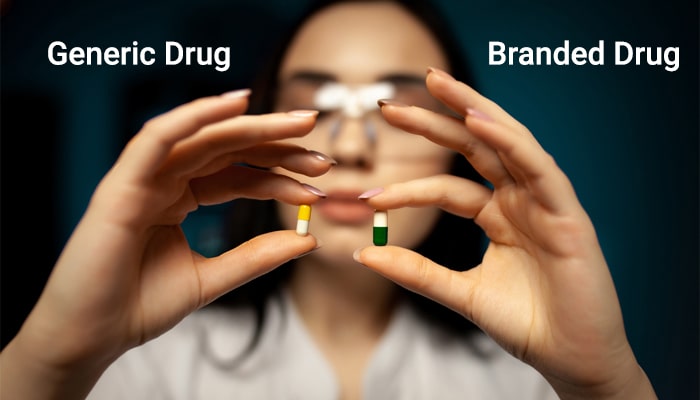How Generic Drug is Different from the Branded Drug?
After using the brand drug it becomes a little difficult to trust using the generic drug. Let’s first understand what a generic drug is. A generic drug is nothing but a replica of the patent drug; it contains the same salt, is equally safe, and has similar strength. It is approved after undergoing the various testing process that is used by the Food and Drug Administration (FDA) to meet the drug safety standards.
Brand vs Generic Drug:

- Let’s first understand what are Brand drugs or Patent drugs. A patented drug is a drug that is developed by huge investments made by a pharmaceutical company. These drugs are sold under a patent name and hence cannot be sold or produced by any other pharmaceutical company. The patent can last for almost 20 years of time and the same can be issued during the drug approval process. The generic drug has similar effects as a patent one and takes the same amount of time as brand drugs.
- As patented drugs include huge investments in the entire process, including research, development, marketing, and promotion, the price of drugs is very high. On the other hand, this cost is not there in generic drugs, so they are affordable.
- As soon as the patent term is about to expire other manufacturers with the approval of the FDA can sell these drugs under the generic drug version. These drugs don’t involve huge manufacturing costs; hence can be sold at a discounted price to customers. Also, once the drug is available under the generic version there is a lot of competition in the market, which brings down the cost of the drug. Currently, almost half of the prescriptions include generic drugs.
Is it Safe to Buy Generic Drugs?
A generic drug should contain active ingredients similar to the brand name, however, inactive ingredients can differ. Inactive ingredients include preservatives, colors, or other fillers. So, to offer a generic drug in the market it is important for a pharmaceutical company to market their drug with the bioequivalency proof to the Food and Drug Administration (FDA).
By bioequivalency, it means the generic drug should be absorbed at a similar speed as the brand drug. The guidelines keep changing as per the drug type and may be different for a different drug. According to the FDA, all drugs, whether patented or generic must meet the FDA guidelines.
No matter whether it is a generic or patented drug meeting the FDA standard is important. They perform drug inspections to be sure about the quality of drugs manufactured and sold. Also, most of the patent drug dealers on license expiration make the generic version of their patent drugs, however, they sell them in the market without any brand name.
How can I clear my Doubts on the Generic Drugs?
To clear all the doubts on the generic drug, you can ask your pharmacist to show the Orange Book. You must be wondering what an Orange Book is. An orange book is a book that contains drug listings by their bioequivalency status. Your pharmacist has access to this book and can search by adding brand name and active ingredients of the drug.
How to Decide on Generic Drugs?
If your doctor writes a prescription drug that falls under a brand name, then it’s your pharmacist’s job to call the doctor and talk about the substitutes available for that drug in a generic version. Also, you can call the doctor and ask to suggest the same drug in a generic version. You can ask a lot of questions to understand the generic vs. Brand name drugs. This will help you save on prescription drug costs too.
Related Article:
https://www.medsengage.com/blog/why-generic-drugs-are-cheaper-than-brand-drugs/

